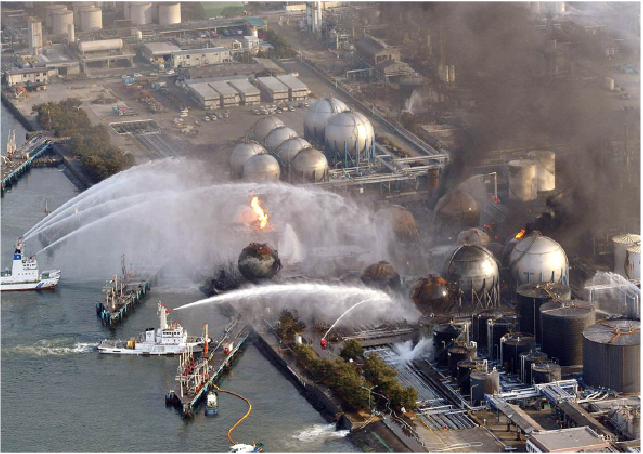The Tokyo 2020 Olympics reflects a sense of optimism to the world community and has become a centerpiece of the Abe administration’s economic revival plans. Still, when the curtain is drawn back, this sense of elation is belied by a smeared darkened reality, exposing a seriously flawed fiscal state of affairs as well as an ongoing out-of-control nuclear disaster in the backyard of upcoming Olympic events. Whether Japan is suitable to hold the Olympic games has not been a subject of widespread journalistic controversy. This article examines the issue in that context.
On September 7th 2013 Japan was awarded the 2020 Summer Olympics. However, on a fiscal basis as well as on an ethical basis, whether the Olympics should really be sanctioned for Japan is a multi-faceted question that goes to the heart of a wobbly, unsure fiscal condition as well as an ill-defined existential threat associated with an out-of-control nuclear meltdown smack dab in the backyard of prospective Olympic events, e.g., Fukushima Prefecture wants to host baseball and softball games, maybe soccer.
This therefore begs the question of whether the International Olympic Committee (IOC) gave due consideration to the safety of athletes and spectators. What criteria did the IOC follow regarding the threat of further complications from the ongoing Fukushima Daiichi Nuclear Power Plant meltdown or for that matter Japan’s problematic fiscal affairs?
Japan won the right to host the 2020 Olympics with a bid to spend $5 billion, which is suspiciously small, especially in an historical context. For the record, rival Istanbul’s bid was almost $20 billion, a much more realistic commitment for such a momentous worldly event.
As it happens, Olympic bids are never, ever met. For example, the Sochi, Russia 2014 Winter Olympic Games original bid at $12 billion eventually came in at approximately $50 billion total costs.1
Whereas in the case of Japan, its extremely low bid is darkly overshadowed by a challenging, possibly dire, fiscal situation, highly dependent upon how well their economy develops. As recently as July 2015, the IMF warned: “Japan’s public debt is unsustainable under current policies.”2 The country’s debt is 245% of GDP, substantially above Greece’s 175%. Wherefore, on a fiscal basis alone, a country with Greece’s balance sheet is a stronger candidate to hold the Olympics.
It should be noted, however, that an excessive national debt-GDP ratio does not necessarily inhibit construction of Olympic venues. After all, the Abe government has arranged for costs to be shared amongst the central government, the Tokyo metropolitan government, and the Japan Sport Council.
Nevertheless, according to The Economist magazine, Japan’s heavy debt load is “easily the highest in the world and still growing.” As well, and more disturbing yet, also stated in The Economist: “Even a modest rise in borrowing costs could bring insolvency.”3 This alarming suggestion by a prestigious financial publication introduces a whole new dimension of risks to the success of the 2020 games, meaning, what if interest rates do turn up, too much? How would the ensuing topsy-turvy Japanese economy impact the games?
After all, the Bank of Japan (BoJ) has been buying financial assets hand-over-fist at an annual pace of $662bn in order to keep the ship of state (liquidity) afloat. As it happens, BoJ asset purchases means the government now owns 32% of its own debt. According to The Economist: “At the current pace of purchases, the share of government bonds held by the central bank will rise to two-thirds by 2020.”4
Over time, BoJ purchasing its own debt results in financial cannibalism whereby the nation/state consumes itself. Ergo, the financial ramifications are legion but vaguely defined, if only because no nation/state has yet to experience the ramifications of Quantitative Easing (QE), or central bank behaviour that far and away exceeds the normal scope of standard monetary policy. As such, QE remains experimental on the worldwide stage, and indeed Japan is one of many guinea pigs. How does it end?
Lo and behold, according to The Economist, “Given that faster inflation is what Japan has sought in vain for two decades, and that the only alternative seems to be waiting patiently for a debt crisis, monetary madness does not look so bad. It has the further advantage of following the path of least resistance.”5
Alas, metaphorically speaking, Japan’s fiscal status has the wherewithal of a one-legged juggler standing in a vat of Jell-O.
Of course, if BoJ stays the course until 2020, thereby accumulating two-thirds of its own government bonds, that is when the Olympic games open. Thus and therefore, if orthodox economics finally take hold in Japan over the upcoming years, massive governmental monetisation could generate rapid inflation concurrent with currency collapse. Many Olympic attendees would be deterred from attendance.
Like the Sword of Damocles hanging over the Abe government: (1) inflationary risks, or conversely (2) deflationary risks (if past trends continue), or (3) the unknown risks of out-of-control rampant radiation exposure from Fukushima hover over the upcoming 2020 Olympics. Interestingly but wistfully, Japan is thus more vulnerable on those three counts than any other major candidate for holding the games.
Ipso facto, certain parties within the country question whether the Olympics should be held at all, meaning maybe the country should consider cancellation altogether. This viewpoint is not suggested by a radical fringe element, rather by some persons of stature.
Mitsuhei Murata, former Japanese ambassador to Switzerland, has publicly called for an “honorable retreat” from hosting the 2020 Olympics while there is still time to select and prepare an alternative site. Mr. Murata’s rationale brings to light several concerns, including the pretension that everything is A-Okay with Fukushima, as Japan prepares for and markets the 2020 Olympics to the world.6
Au contraire, everything is not A-Okay!
As for example, the former ambassador discusses alleged misrepresentations by his government about the status of the nuclear meltdown to the Olympic Committee, e.g., the PM allegedly claimed it was “under control.” To the contrary, the nuclear plant has never been under control.
Still, of much more concern, the present and the future outlook is cloudy, at best. Spent fuel rods suspended in fuel pools in reactors 1,2, and 3 cannot be removed due to high levels of radioactivity.7 The fuel rods are essentially time bombs of radioactivity contained within damaged structures.
Additionally, as recent as December 2014 radioactive iodine-131 and tellurium-132 were detected in Takasaki City, Gunma Prefecture, which is approximately 130 miles away from Fukushima.8 “Given the short half-lives of these radioactive particles, their presence could not be the result of the original meltdowns at Fukushima.” If not from the original meltdown, then as recently as one year ago, radioactive particles were still radiating, traveling hither and thither 130 miles away from the nuclear facility.
As such, in Mr. Murata’s words: “The future of the Olympic Games is at stake. It is as a believer in the spirit of the Olympic Games and the Olympic Movement that I am pleading for an honorable retreat, and this, in order for Japan to devote maximum efforts to controlling the Fukushima crisis.”9
Basically, Fukushima is an out-of-control radioactive reincarnate of the iconic character Godzilla. When Tokyo was first awarded the 2020 Olympics, Nature News, the international weekly journal of science, opined: “As Fukushima Radiation Rages, Tokyo Awarded Bid to Host 2020 Summer Olympics, Hilariously Named the ‘Safe Games’: Why would any sane organisation vote to host a global event that brings hundreds of thousands of people to a location just a short distance away from a collapsing nuclear power plant that is utterly and completely out of control with no end in sight?”10 Good question.
Along those same lines, as recently as October 30, 2015, The Japan Times reported: “Extremely high radiation levels and the inability to grasp the details about melted nuclear fuel make it impossible for the utility to chart the course of its planned decommissioning of the reactors at the plant.”
But, the games go on even though the status of Fukushima’s broken down nuclear reactors is touch-and-go at best and certainly could be much worse. Also, it’s certainly not “under control.” Of even more concern, and unfortunately it does get worse; the Fukushima Daiichi Nuclear Power Plant No. 2 nuclear reactor core fuel (aka: corium) is missing from the core containment vessel.11
Where did it go? Nobody knows.
Not only that but the ‘learning curve’ for a total nuclear meltdown is as fresh as the event itself because the world has never seen anything like it, never before. Molten core is missing from the containment vessel, thereby questioning whether it has burrowed through the secondary reinforced steel concrete containment vessel into Earth. Thus and therefore, hidden danger lurks within and/or underneath a nuclear reactor complex that nobody understands and cannot decommission because it’s too dangerous.
If in fact a melted nuclear core penetrates its steel-reinforced concrete containment vessel and burrows into the ground, it likely results in deadly isotopes uncontrollably spreading erratically, ubiquitously into surrounding underground soil and water. In that regard, it is difficult to imagine conducting the Olympics in a region where melted nuclear core is still at large. But, how to find the melted core may be a problem for the ages.
Radioactive isotopes are extremely lethal, to wit: “High-level nuclear waste is almost unimaginably poisonous. Take for example cesium-137, with a half-life of 30 years, which makes up the largest fraction of long-lived radionuclides residing in spent nuclear fuel. One gram of radioactive cesium-137 (about half the size of a dime) contains 88 Curies of radioactivity. 104 Curies of radioactive cesium-137, spread evenly over one square mile of land, will make it uninhabitable for more than a century.”12
As it happens, Fukushima is an extraordinarily dangerous wild card that nobody knows how to fix. Yet, the games go on.
In fairness to Tokyo 2020, a spokesperson stated: “Radiation levels in the air and water of Tokyo are safe… Measures have been done even before the 2011 nuclear accident in Fukushima, and they show that radiation levels in Tokyo are absolutely safe and normal – comparable with levels in other major cities, like London, New York and Paris.”13
Even so, suspicion remains in many quarters regarding the safety and security of the Fukushima nuclear complex as TEPCO repeatedly encounters one problem after another, as if the ill-fated hand of Godzilla, Japan’s iconic pop culture image of unrelenting horror, conceived in 1954 as a metaphor for nuclear weapons, awakened from the sea and empowered by nuclear radiation, dominates the domain.
As it happens, dangerous latent forces within Japan’s unrelenting nuclear meltdown, combined with way too much government debt, are explosive ingredients for likely surprises beyond wildest imagination, with consequences the IOC could not possibly compute. But, it goes without saying the probability of serious complications is clearly present, and pressing.
Former ambassador Murata’s insistence that the games be canceled is a tough pill to swallow as Japan’s national pride is interwoven into the fabric of great expectations. Nevertheless, at the very least, the world community would likely gain some semblance of comfort should the IOC conduct a third-party independent analysis of the Fukushima nuclear meltdown dilemma.
After all, Japan has been designated to hold the Olympics. That is final. It is extremely doubtful that the Abe administration would ever consider cancelling, especially as there is no groundswell of public opinion to do so.
As for public opinion, it is instructive to look at Japan’s new state secrecy law Act on the Protection of Specially Designated Secrets (SDS) Act No. 108 of 2013 passed on the heels of the Fukushima meltdown, similar to Japan’s ‘public peace and order controls’ of WWII. According to Susumu Murakoshi, president of the Japan Federation of Bar Associations: “The law should be abolished because it jeopardises democracy and the people’s right to know.”14
Public opinion is shaped by public knowledge of events, and in that regard, the Abe government’s enactment of an extraordinarily broad secrecy law with the threat of prison sentences up to 10 years for any violators of indeterminate wide-open offenses undermines confidence in believability of the Japanese government. But categorically, Japan needs to nurture confidence.
In short, Japanese politicians have carte blanche authority to incriminate anybody deemed to have broken the new secrecy law, as defined by the accuser. As such, Japan’s secrecy law casts a long shadow over journalistic attempts to uncover major issues of international concern, like the nuclear meltdown.
In a manner of speaking, there is little doubt the upcoming Olympics serves to whitewash the complexities of Japan’s fiscal policies as well as upstage an ongoing nuclear disaster. Simply put, when a country hosts the greatest show on Earth, worldwide opinion naturally assumes all is well. If it were otherwise, people trust that the show would not go on.
About the Author
 Robert Hunziker, MA, economic history DePaul University, awarded membership in Pi Gamma Mu International Academic Honor Society in Social Sciences is a freelance writer and environmental journalist who has over 200 articles published, including several translated into foreign languages, appearing in over 50 journals, magazines, and sites worldwide. He has been interviewed on numerous FM radio programs, as well as television.
Robert Hunziker, MA, economic history DePaul University, awarded membership in Pi Gamma Mu International Academic Honor Society in Social Sciences is a freelance writer and environmental journalist who has over 200 articles published, including several translated into foreign languages, appearing in over 50 journals, magazines, and sites worldwide. He has been interviewed on numerous FM radio programs, as well as television.
References
1. Why Tokyo’s Olympic Costs Will Almost Certainly Overrun The $5 Billion Budget, Business Insider, Sept. 17, 2013
2. IMF Warns Japan Over its Staggering National Debt, CNN Money, July 24, 2015
3. The Japanese Solution, The Economist, Nov. 7th 2015
4. Ibid.
5. Ibid.
6. Time has Come for an ‘Honorable Retreat’ From Tokyo 2020 Over Fukushima, The Japan Times, November 4, 2015
7. Esther Tanquintic-Misa, TEPCO Finishes Removing 400 Tonnes of Spent Fuel Rod From Fukushima Reactor 4, International Business Times, Nov. 6, 2014.
8. Time has Come for an ‘Honorable Retreat’ From Tokyo 2020 Over Fukushima, The Japan Times, November 4, 2015
9. Mitsuhei Murata, Former Japanese Ambassador to Switzerland and Executive Director, Japan Society for Global System and Ethics, Tokyo, October 28, 2015.
10. As Fukushima Radiation Rages, Tokyo Awarded Bid to Host 2020 Summer Olympics, Hilariously Named the ‘Safe Games, Nature News, Sept. 8, 2013
11. Up to 100% of No. 2 Reactor Fuel May Have Melted, NHK World News, Sept. 25, 2015
12. Comments on Draft of Nuclear Waste Administration Act of 2013, Physicians for Social Responsibility, May 23, 2013.
13. Opposition Overshadows Tokyo Olympics Excitement, Deutsche Welle, Oct. 10, 2013.
14. Jeff Kingston, Abe’s Secrets Law Undermines Japan’s Democracy Undermines Japan’s Democracy, The Japan Times, Dec. 13, 2014.


































































